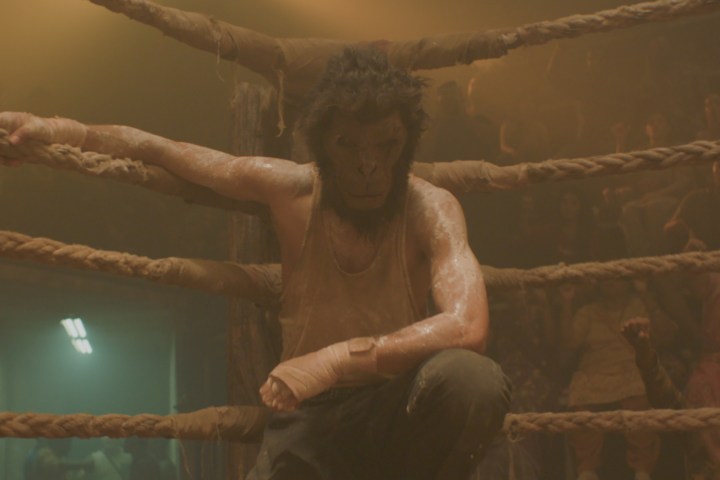
“Dev Patel’s directorial debut is an unwieldy, feverish revenge thriller that wins you over despite its flaws.”
Pros
- Dev Patel’s fully committed lead performance
- One breathtaking midpoint action sequence
- A well-paced, propulsive first half
Cons
- An overlong runtime
- Too much shaky cam
- A second half that stops and starts too many times
Monkey Man isn’t a kick or punch to the face. It’s an existential wail. Actor Dev Patel’s feature directorial debut, which was famously saved from its original Netflix release by Jordan Peele and Universal Pictures, doesn’t seem capable of holding back. It’s full of more disorienting stylistic flourishes than it knows what to do with and plenty of sweaty, bone-breaking action sequences, but pulsing beneath every one of its frames is an intense rage that is, at times, astonishing. Patel’s passion is never in doubt, and he believes so fervently in the film’s ideas about corruption and justice that he treats his protagonist’s familiar quest for revenge with a divine kind of reverence.
There are so many emotions, references, and inspirations spilling out of Monkey Man that one gets the sense watching it that Patel has been waiting his entire life to make it. The movie feels like the culmination of many of Patel’s artistic interests up to this point, and it’s clear that he put it together without assuming he’ll ever get the chance to direct another film like it. As admirable as that is, it’s also led Patel to stuff more into Monkey Man than it’s capable of containing. He’s delivered a vigilante thriller that doesn’t feel like a targeted strike so much as it does a violent thrashing, and the finished film is just as spirited and messy as that suggests.

At the center of Monkey Man is Kid (Patel), an unnamed young man who spends his days and nights in India boxing in underground matches and putting together a plan to find and kill Rana Singh (Sikandar Kher), the corrupt police chief responsible for his mother’s death years prior. In brief flashbacks, viewers are given glimpses of not only the gruesome tragedy that drives Patel’s anonymous vigilante forward but also the happy childhood memories he shared with his mother, which haunt him just as much as her death. These moments, in all their handheld, Malick-esque intimacy, are visually striking but do little more than obscure the full truth of Monkey Man‘s inciting incident, which the film waits to reveal in a protracted sequence that just contributes further to its second act’s pacing issues.
Before it gets there, though, Monkey Man spends much of its first half in the present. It follows its protagonist as he patiently works his way into the debaucherous club where Singh spends most of his nights. This section of the film, while slower than some may go into Monkey Man expecting, demonstrates a level of narrative control on Patel’s part that is immensely satisfying to behold. The movie’s script, which Patel co-wrote with Paul Angunawela and John Collee, wisely packs its first half with minor pay-offs that offer viewers key insight into its protagonist’s intelligence and determination and help Monkey Man slowly build more and more momentum. Eventually, everything reaches a fever pitch around the film’s midpoint with a batch of back-to-back set pieces that are as thrilling as they are anxiety-inducing.
The sequence in question marks Monkey Man‘s emotional and stylistic high point. Through a deft combination of close-ups, shaky camera movements, and stunning pieces of action choreography, Patel is able to inject Monkey Man‘s most feverishly constructed and hard-hitting section with a level of emotional ferocity that will make you lean forward in your seat. That is also, in no small part, due to Patel’s impassioned central turn. The actor, who has long been recognized by many as one of the most promising stars of his generation, throws himself so relentlessly into his character’s tortured psyche that he almost single-handedly reminds you why revenge stories came to be in the first place. You fully believe every emotion and attack that Patel performs in Monkey Man, and that adds a lot to the film, especially once it starts to lose its footing in its back half.

After turning everything up halfway through its story, Monkey Man deliberately slows down again to further explore its hero’s past and broaden its political ideas. Patel’s protagonist finds some much-needed refuge in this section with a group of transgender women who have long been hounded and terrorized by figures like Singh, who want to displace them, and this detour allows Monkey Man to sharpen its cultural critiques a little. The same goes for its late-stage centering of Baba Shakti (Makarand Deshpande), a powerful and revered religious figure. However, neither plotline is ultimately developed enough to render the film’s story as anything more nuanced than a familiar tale of an underdog fighting against the world’s corrupt elites.
Monkey Man‘s third-act fights feel similarly unrefined. When the film begins, its hero is driven but not sure-footed enough to accomplish everything he wants. That fact makes Patel’s up-close, shaky approach to Monkey Man‘s action sequences seem initially calculated and warranted. The longer into the movie one gets, though, the more frustrating Monkey Man‘s uneven mix of shaky and steady camera takes becomes. One climactic showdown, in particular, suffers greatly from the visually unpleasant haze of smoke that covers it and the unsteady way it’s shot. The film, by no means, goes out with a whimper, but its final set pieces do fall short of the bar set by those that come before them.
What Monkey Man lacks in high-level technical craftsmanship, it makes up for in both attitude and spirit. This is a directorial debut made with so much passion and genuine emotion that you’ll inevitably find yourself admiring it even in its most frustrating moments. By all accounts, Patel’s road to making Monkey Man was plagued by multiple physical and mental hardships, and that’s clear in the film itself. It’s a movie that constantly feels as though it was forced into existence, and the sense of hard-won victory that is consequently present throughout it makes its most vengeful moments hit harder than they might have otherwise.
Monkey Man is now playing in theaters.
Editors’ Recommendations

